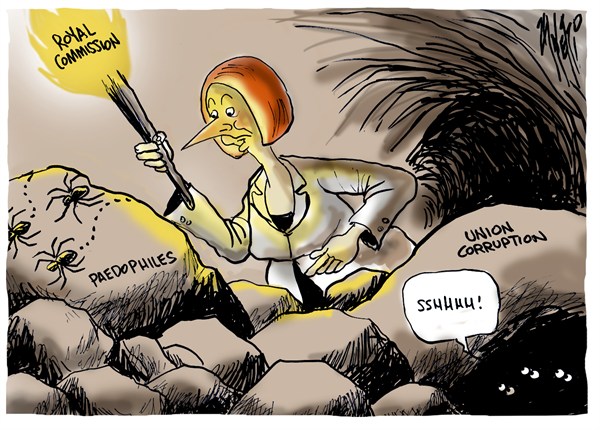Search
Democracy Links
Member's Off-site Blogs
commission & omission ....

from Crikey …..
Royal commission on child abuse will be transformative
CATHOLIC CHURCH, ROYAL COMMISSION INTO SEX ABUSE
The royal commission into institutional child sexual abuse, and those who failed to respond to it, announced by the Prime Minister yesterday will run well beyond the next election; indeed, may well run beyond the election beyond that.
A similar inquiry in Ireland, albeit with a wider remit to examine all forms of child abuse within Irish institutions, took 10 years. One of the outcomes is likely to be a steady drip of horrific stories and nightmarish recollections of people whose childhoods, indeed entire lives, were ruined by abuse and by the refusal of those in authority to either prevent it or acknowledge their suffering. By affording a sympathetic environment for survivors who want to tell their stories, a royal commission will per se bring a measure of comfort regardless of its eventual report.
Abuse survivors have been calling for a royal commission for a decade or more, so it has hardly arrived in a rush, but the government moved with unexpected speed given senior members were dismissing a royal commission late last week. Once Tony Abbott, who was dismissive even of the need for an apology for Catholic child sex abuse in 2008, admitted the desirability of an inquiry that did not target his church alone, there was no further political hurdle to the government taking action. Even the Catholic hierarchy had backflipped and were welcoming the inquiry by the time it was announced.
There will be some holdouts and deadenders, of course. One conservative commentator is already talking about a "witch-hunt". But the inquiry is likely to be a transformative event. The Irish inquiry permanently altered, and diminished, the role the Catholic Church plays in Irish society.
Anyone who has witnessed the progress of major Australian royal commissions, especially those at a state level, will also be aware that it is impossible to predict the course of the inquiry before it starts, which is one of the reasons major parties are reluctant to initiate them. Terms of reference are the only way politicians can control them; once they are up and running, it is impossible to rein them in.
Those of us who expected major party politicians to be dragged slowly to such a decision, if they ever reached it, must admit to being wrong: recent revelations and the sense that the full story would never be exposed without a significant change of approach have clearly motivated MPs on all sides to look beyond their traditional reluctance to resort to royal commissions.
One calculation would have been that this issue is not going anywhere: there will be a steady stream of further revelations regardless of whether there was a royal commission, each one begging the question of why a national approach wasn't being taken. Better to embrace a royal commission now than look as if they'd been dragged unwillingly to one in a month's time, or next year.
For once both the Prime Minister and the Leader of the Opposition looked leader-like on an issue that needed it. This minority government and the Parliament that produced it may never be well-regarded by voters, but its legacy for hundreds of thousands of Australians affected by child abuse is likely to be a positive one.
- By John Richardson at 13 Nov 2012 - 5:32pm
- John Richardson's blog
- Login or register to post comments
Recent comments
9 hours 24 min ago
9 hours 31 min ago
9 hours 42 min ago
9 hours 45 min ago
9 hours 49 min ago
9 hours 53 min ago
10 hours 3 min ago
11 hours 34 sec ago
13 hours 4 sec ago
13 hours 49 min ago